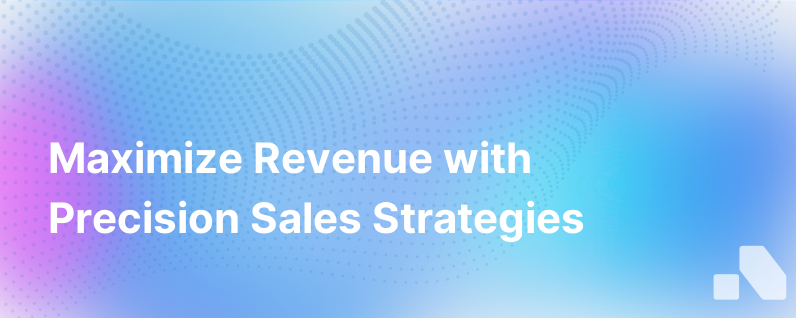Revenue Precision
Published on September 19, 2023 by David Zhang
In the shifting sands of the modern business landscape, a company's ability to target and hit precise revenue goals has never been more critical. Known as 'revenue precision,' this practice of finely-tuning all aspects of a business's revenue-generation machine is an art backed up by hard data and sophisticated strategies. For companies that master it, the result is not just about hitting a number—it's about predictable growth, operational efficiency, and a resilient business model even amid economic uncertainty.
Defining Revenue Precision
Revenue precision is the laser-focused art and science of aligning all aspects of the business's sales, marketing, and customer service apparatus to accurately predict and achieve targeted revenue outcomes. This encompasses the entire lifecycle of revenue generation, from pipeline forecasting and sales activities to pricing strategies and customer retention.
The Importance of Precision in Revenue Forecasting
Predicting business revenues with precision is crucial for several reasons. It enables businesses to allocate resources optimally, underscores credibility with investors, assists with cash flow management, and sets clear targets for sales and marketing teams. In highly competitive markets, precision can mean the difference between staying afloat and surging ahead of the competition.
Consider a situation where overestimating revenue leads to overhiring, excessive spend on marketing, and cash flow problems when the forecasted sales fail to materialize. On the flip side, underestimating revenue could mean missed opportunities for growth and market capture. The precision of these predictions is non-negotiable in maintaining business vitality.
Components of Achieving Revenue Precision
Achieving revenue precision is not a plug-and-play process; it involves an ecosystem of tactics, each of which needs meticulous attention. Here’s how businesses can strategize for each component:
Data-Driven Decision-Making
Leveraging data analytics is at the heart of revenue precision. Through robust data-mining techniques, businesses can understand past performance patterns, identify predictive indicators, and segment markets and customers for targeted sales approaches. Predictive analytics and AI play a pivotal role here, transforming raw data into actionable insights, uncovering hidden opportunities, and flagging potential risks before they impact the bottom line.
Customer Insights
Understanding customer purchasing behaviors, preferences, and requirements is a linchpin for precise revenue targeting. This involves deep dives into customer data, gathering rich insights from various touchpoints, and using this information to finely hone product offerings, pricing, and promotional strategies that resonate with the target audience.
Streamlined Sales Processes
A streamlined, efficient sales process that reduces friction and accelerates the sales cycle contributes significantly to revenue precision. By investing in sales enablement tools and training, sales teams can be more agile, adaptive, and responsive to market changes and customer needs. CRM tools, for instance, assist in tracking sales activities, automating routine tasks, and delivering critical insights for improved sales strategy.
Pricing Strategy Optimization
Pricing strategy is integral to revenue precision. Dynamic pricing models that reflect real-time market conditions, competitive landscapes, and customer willingness to pay help in crafting pricing approaches that maximize revenue potential while maintaining customer satisfaction.
Feedback Loops and Continual Improvement
The revenue generation process is dynamic and ever-changing. Therefore, establishing feedback loops through customer feedback, sales performance metrics, and market trend analysis is key to continually refining your revenue model. Adaptability is key as the market landscape and consumer behavior shifts, as is a willingness to iterate and evolve strategies in pursuit of revenue precision.
Challenges to Revenue Precision
Despite the promise of data analytics and intelligent sales strategies, several challenges can derail efforts to fine-tune revenue precision:
- Data Overload: In the era of big data, sifting through volumes of data to find actionable insights can be daunting. Identifying which data points are truly influential in revenue outcomes is often the first hurdle.
- Market Volatility: From geopolitical tensions to unexpected global events, changes in the market can upend even the most well-researched predictions.
- Siloes Within Organizations: When sales, marketing, and customer service operate in isolation, the lack of integrated strategies can cause inefficiencies and overlooked opportunities for revenue optimization.
- Resistance to Change: Legacy systems and a resistance to embracing new processes and technologies can slow down a company's ability to innovate towards revenue precision.
Case Studies and Real-World Applications
To better understand revenue precision in action, let's look at how diverse industries have applied the concept:
- SaaS companies use recurring revenue models and customer usage data to forecast revenues with high accuracy. Through data analysis, they identify up-sell and cross-sell opportunities, driving growth without necessarily expanding the customer base.
- Retailers, particularly e-commerce platforms, harness machine learning to adjust pricing in real-time, accounting for demand fluctuations and competitor pricing, to maximize profits.
- Manufacturers lean on supply chain insights and market forecasts to adjust production schedules, ensuring they meet demand without overproducing, which could lead to stock storage costs or markdowns.
Conclusion and Our Role at Aomni
Revenue precision is a journey, not a destination. It demands agility, a willingness to learn from data, and a culture that balances strategic foresight with the flexibility to change course when required. At Aomni, we understand that the road to revenue precision comes with its unique set of complexities and opportunities.
Our platform integrates the tools necessary for strategic B2B sales—real-time account research, competitive insights, and personalized content creation—to empower businesses in this journey. With Aomni, companies can transcend traditional sales methods, embracing a data-driven approach that ensures revenue goals aren't just a target but a strategic compass guiding every step of organizational growth.